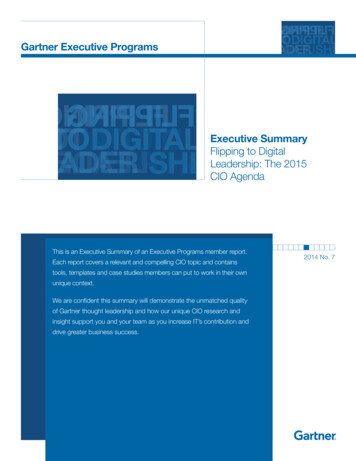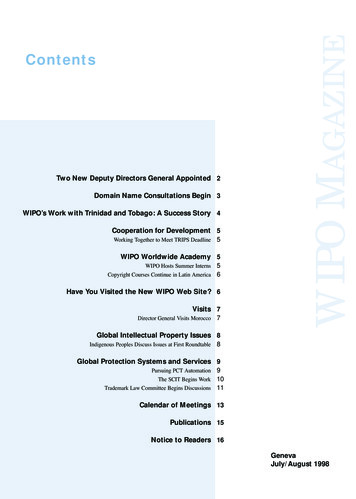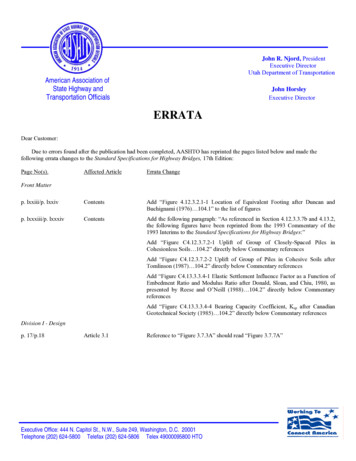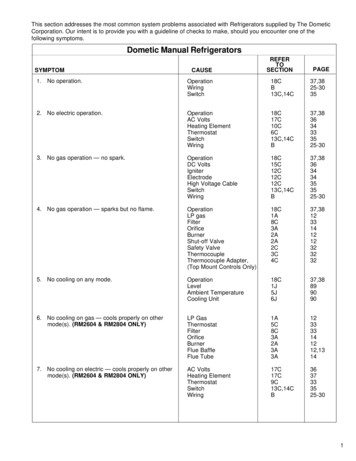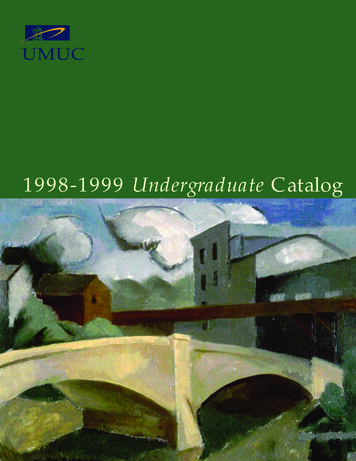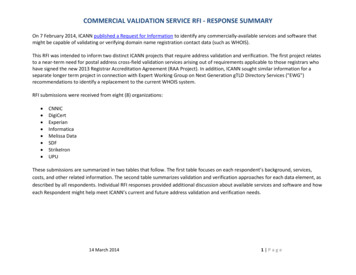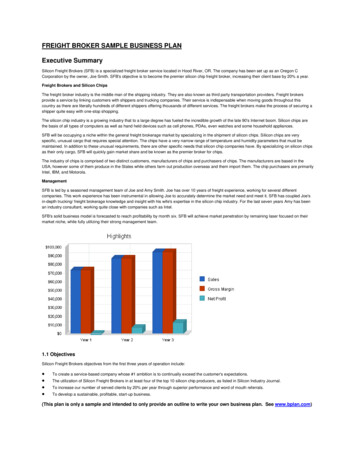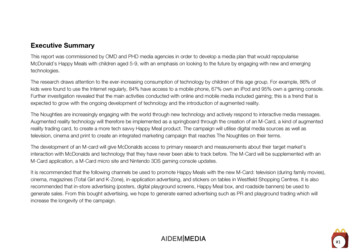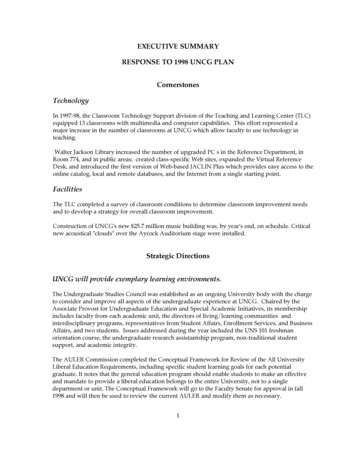
Transcription
EXECUTIVE SUMMARYRESPONSE TO 1998 UNCG PLANCornerstonesTechnologyIn 1997-98, the Classroom Technology Support division of the Teaching and Learning Center (TLC)equipped 13 classrooms with multimedia and computer capabilities. This effort represented amajor increase in the number of classrooms at UNCG which allow faculty to use technology inteaching.Walter Jackson Library increased the number of upgraded PC’s in the Reference Department, inRoom 774, and in public areas; created class-specific Web sites, expanded the Virtual ReferenceDesk, and introduced the first version of Web-based JACLIN Plus which provides easy access to theonline catalog, local and remote databases, and the Internet from a single starting point.FacilitiesThe TLC completed a survey of classroom conditions to determine classroom improvement needsand to develop a strategy for overall classroom improvement.Construction of UNCG's new 25.7 million music building was, by year's end, on schedule. Criticalnew acoustical "clouds" over the Aycock Auditorium stage were installed.Strategic DirectionsUNCG will provide exemplary learning environments.The Undergraduate Studies Council was established as an ongoing University body with the chargeto consider and improve all aspects of the undergraduate experience at UNCG. Chaired by theAssociate Provost for Undergraduate Education and Special Academic Initiatives, its membershipincludes faculty from each academic unit, the directors of living/learning communities andinterdisciplinary programs, representatives from Student Affairs, Enrollment Services, and BusinessAffairs, and two students. Issues addressed during the year included the UNS 101 freshmanorientation course, the undergraduate research assistantship program, non-traditional studentsupport, and academic integrity.The AULER Commission completed the Conceptual Framework for Review of the All UniversityLiberal Education Requirements, including specific student learning goals for each potentialgraduate. It notes that the general education program should enable students to make an effectiveand mandate to provide a liberal education belongs to the entire University, not to a singledepartment or unit. The Conceptual Framework will go to the Faculty Senate for approval in fall1998 and will then be used to review the current AULER and modify them as necessary.1
This year, the College of Arts and Sciences initiated a full-scale exploration of where it is and whereit needs to be going with learning technologies. Simultaneously, with the assistance of UniversityTeaching and Learning Center, it began a regular series of faculty workshops on web-basedinstruction. The Department of Anthropology has dramatically expanded use of computer-basedmultimedia technology. The Department of Art has developed a state of the art Digital ImagingStudio. The Department of Chemistry has developed a web site for the General Chemistry course.The Department of Geography has obtained a field camp, which will stimulate geographic researchamong faculty and students.The Department of Political Science now ensures that graduates have the quantitative and dataanalysis abilities expected of social sciences graduates today, by regularly employing computerbased data analysis projects in advanced courses.The Department of Psychology is developing a new undergraduate curriculum that will provide abetter grounding in scientific psychology by including intermediate and advanced laboratories.The Department of Romance Languages in cooperation with Residence Life has sponsored andprovided faculty leadership for a Spanish Hall in the newly renovated Phillips/Hawkins dormitory;will add a French Hall next year.Significant progress was made on the continued internationalization of programs of the BryanSchool of Business and Economics. At the undergraduate level, International Business Studies waschanged to a program area in the Bryan School. Curriculum changes included the addition ofcourses in international business and the international economy, and a foreign languagerequirement. An Introduction to International Business course was added to the required MBAcurriculum.Implementation of the MS in Information Technology and Management is underway. The ISOMfaculty has developed nine new courses for the program. A full class is expected for fall 1998.This year, departmental reviews were conducted for the Departments of Economics and Accountingto build on the quality and distinctiveness of the educational experience.The Department of Accounting established a Student Tax Clinic, the only one in North Carolina andone of only a very few in the U.S. In cooperation with local businesses, the Department ofAccounting has also established an internship program for its graduate students.Faculty in the Department of Dance have increased the use of performance exams which arevideotaped; students and faculty often watch these together during conferences.Some Dance courses are being redesigned to incorporate more movement opportunities andopportunities to gain computer-related research and presentation skills.The Department of Leisure Studies conducted a follow-up study of its graduates to evaluate theirperceptions of the quality of the undergraduate education experience.The American Apparel manufacturers Association certified the curriculum, laboratory facilities, and2
student learning experiences of the Department of Textile Design and Marketing as exemplary;UNCG’s textile products design program is one of two in the State to have this recognition and oneof ten programs nationally.Masters degree programs in the School of Music were ranked among the top 30 in the country byU.S. News and World Report . minars, attended master classes, and continued study with notedartist-teachers. A new faculty-student string ensemble, the Gate City Camerata, debuted during theFall Semester. Several new faculty and students began utilizing the "Vivace" system, astate-of-the-art technological "accompanist" for instrumentalists and vocalists. The School’s firstdepartment/division review included all undergraduate and graduate curricula.Equity funding allowed for the complete renovation and updating of the learning laboratory in theSchool of Nursing and the subsequent dedication of the Eloise R. Lewis Nursing PerformanceCenter.At the undergraduate level, the RN-BSN curriculum was revised to better meet the needs of RNstudents and healthcare employers. A post baccalaureate certificate in Case Management also wasapproved to prepare nurses to work in the managed care environment. In the Masters programrevisions created the Adult Nurse Practitioner/Gerontological Nurse Practitioner concentration inresponse to needs identified by graduates in practice. A certificate program for international nurseanesthetists also was developed to meet the growing needs for continuing education in that field.The School of Nursing and the Bryan School of Business and Economics were approved to plan acombined MSN/MBA program.The Women in Science Initiative was created as a Women’s Studies committee and charged toreview and reduce barriers that might discourage females science students. The group carried out twoprojects 1) a transcribed focus group session to gather input from currently enrolled femalescience majors and 2) a program to provide additional funding support to science departmentsto support distinguished female scholars invited for research seminars who also agreed to meetwith female students in two informal sessions.A Learning Assistance Center was created in Reynolds Hall to provide tutoring assistance toundergraduates.A lounge was established in Elliott Center where commuting students can relax and study.To help promote “diversity and global awareness,” the Office of International Programs expandedthe University’s international community by increasing the number of international students oncampus (degree-seeking, exchange, and INTERLINK), developed the new International House (inPhillips-Hawkins), revitalized of the International Student Association, and conducted several socialand academic programs.In September, 1997 UNCG established a Teaching, Learning and Technology Roundtable led by theDirector of TLC and the Director of the Library. Eight different working groups have been formedto address different issues related to teaching, learning and technology.John Tagg of Palomar College, Tom Creed of St. John’s University, and David Brown of Wake ForestUniversity have come to campus to discuss issues related to creating a learning community and theeffective use of technology. The TLTR sponsored programs featuring the creative use of technology3
by UNCG faculty. During the 1998 spring semester, one of the working groups solicited input fromthe entire UNCG community and a Faculty Senate Forum to complete a Vision for Teaching andLearning at UNCG.In collaboration with Computing and Information Systems (CIS), the TLC installed the Web coursedelivery software, TopClass. TopClass can be used to enhance courses taught in a traditional formatand courses taught at a distance. The software was pilot tested with a small group of faculty in thesummer of 1997.In the fall of 1997, ten classes enrolling approximately 250 students used TopClass to deliverinstruction. In the spring of 1998, twenty-one classes enrolling approximately 700 students are usingTopClass. We reported on UNCG’s experience with TopClass at the conference sponsored byGeneral Administration, The UNC Workshop on the Use of Technology for Distance Education. Inthe fall of 1998, 75 to 100 classes enrolling 3000 students, includeing freshmen composition classes,will utilize TopClass software.Jackson Library offered hundreds of classes to help students navigate the complex informationenvironment and established two new Library faculty positions with responsibilities in the areas ofconsultation, instruction, and training.UNCG will expand its research and infuse the excitement of scholarship into itsteaching and learning.Projections indicate the Graduate School will complete the most successful external contract andgrant award record in the history of the University, with projections of between 16.5 and 16.7million dollars for the fiscal year. Most of the activity within the research sphere during the 1997-98academic year was devoted increasing grant award success within the Center for the Study of SocialIssues (CSSI) and the Institute for Health, Science and Society (IHSS). The third research unit, theInformation Technologies Education Center (ITEC), founded in 1996, will be discontinued at the endof the fiscal year, with administrative oversight of continuing contracts and grants shifted to otheracademic units. In the second year of operation for Minerva, a new research magazine devoted tothematic content on faculty research, the issues Women’s Health and Jobs and the Workforce wereexplored.The Undergraduate Research Assistantship program, a competitive program which provides support( 750 a semester) for approximately 70 juniors and seniors a year to perform research under the closesupervision of faculty, was revised to increase its visibility, its availability to students, and theopportunities for student synthesis and public presentation it offered.The College of Arts and Sciences has dramatically increased activity in the area of undergraduateresearch and internships.The Department of Anthropology received an NSF grant which will provide more and better-fundedresearch experiences for undergraduates in Anthropology.The Art Department has received a 50,000 commission for a site-specific sculpture to be designed bystudents with direction from faculty. The work will be permanently installed at the Piedmont Center.The Department of English has revised requirements for the major to address research as an4
undergraduate learning goal more effectively and the Department of History is exploring ways ofextending research opportunities in 300-level courses.In the Departments of Anthropology, Biology, and Geography, students coauthored articles on theirresearch with faculty.Several courses in Bryan School of Business and Economics have been revised to reflect faculty research,including ECO 312: Economics and Technological Change, and ECO 647: Applied Microeconomics.In the Department of Business Administration, two students took part in a case study of Replacements,Ltd. and will receive recognition as co-authors upon its publication.The department of Leisure Studies has increased its involvement in short-term, pragmatic, and servicerelated active research projects that have real-world application. Such projects have more relevance tothe types of positions students will fill immediately upon graduation and encourage continuing interestin the application of research to their careers.The Institute for Health, Science, and Society provided for the development of a gait analysislaboratory, a cardiac function laboratory, a genetics variation assessment laboratory, and a surveyresearch laboratory. The greater research capacity provided by these activities will provide expandedopportunities for faculty and students to write competitive grant proposals and conduct research.New electronic resources were licensed for the Departments of Mathematics, Information Systems andOperations Management, Food and Nutrition, and Religion.Walter Clinton Jackson Library created Web pages providing information about primary researchmaterial in Special Collections and University Archives.Jackson Library created summaries of the oral history interviews conducted as part of the UNCGCentennial celebration so that researchers can determine which tapes or transcripts contain informationrelevant to particular individuals and events of interest.UNCG will build a strong sense of University Community.The position of Associate Provost for Undergraduate Education and Special Academic Initiatives wascreated at the beginning of the 1997-98 year with the restructuring of an existing associate provostposition in the Office of the Provost. The creation of this position, whose duties include some formerlyconnected with the office (academic program inventory and review; accreditation activities, includinginstitutional effectiveness) and major new duties in general education, coordination and expansion ofliving/learning communities and honors programs, and other initiatives to enhance the undergraduateexperience, demonstrates UNCG commitment to the strategic planning goals to provide exemplarylearning environments and build a strong sense of university community.The Undergraduate Studies Council set the goal of improving the opportunities for nontraditionalstudents, including ACES, transfers, and part-timers, to achieve community at UNCG. A committeedeveloped a set of proposals towards that end which will be taken to appropriate units.The experimental program of Freshmen Learning Communities in Grogan Residence Hall, renamedGrogan College, served approximately ninety freshmen in its first year through common classes,5
residence hall study groups, and activities sponsored by the nine Faculty Fellows. A Senior Fellowposition was developed and filled as of January 1998 to coordinate planning, recruitment, and jointactivities for the program. Extensive planning recruitment activities have ensured a full-scale operationin 1998-99 that will fill Grogan Hall with 280 freshmen in 15 learning communities and increase facultyinvolvement with students and joint activities among the groups.The College of Arts and Sciences has initiated a standing College Programs Committee, whose missionwill be to look for significant opportunities to sponsor forums and symposia of broad internal andexternal interest.The Department of Anthropology sponsored a Native American Festival.The Art Department completed a cooperative venture with the Weatherspoon Art gallery including theco-sponsorship of Follow Your Heart to the Art Gallery Crawl, featuring the Weatherspoon, McIver andEUC Galleries.The Department of English sponsored the All English 101 Read (Snow Falling on Cedars).The Department of History has revitalized its History Club.In the Fall the MFA Writing Program sponsored "Sleeping Beauty: Creative Writing at UNCG, AnExhibit, Jackson Library." This exhibition featured books and manuscripts by alumni, faculty andvisiting faculty.In February the English Department sponsored its annual symposium, "Fries with That? What Do WeDo with the Liberal Arts?" The symposium featured speakers from the Corporation of PublicBroadcasting, the Mellon Foundation, Duke University, and the University of Michigan.Women's Studies at UNCG celebrated its 25th anniversary with a reunion/awards dinner at whichprevious directors attended and spoke. The crowning moment was The Friends of Women's Studies'announcement of the successful completion of the fundraising drive to endow an excellenceprofessorship in Women's Studies.The UNCG Theater celebrated its 75th Anniversary Season by offering an exciting variety ofproductions throughout the year, beginning with a musical revue that combined the talents of faculty(Tom Behm, Frank Donaldson, Lorraine Shackelford, and Bob Hansen), staff, alumni, and students;proceeds supported the Middleton Scholarship. UNCG Summer Theater, NCTYP campus productions,and Workshop Theater performances also pleased audiences this year.The Bryan School of Business and Economics implemented a new Instrument of Governmentfeaturing a stronger leadership team of administrators and faculty committee leaders. Small groupmeetings with faculty have been held throughout the year to give faculty an opportunity to discussissues such as distance learning as they came up.The Bryan School worked with Visions, Inc., to assess the climate in the School with respect tomulticulturalism. Focus groups were held in March involving faculty, staff, and students. The Visionspersonnel returned in May to present their findings and to conduct an intensive three-day trainingsession for twenty-one of the School’s personnel.The Bryan School Student Advisory Council devised a program with suggestion boxes where students,6
University employees, or visitors could leave comments.The Department of Dance has initiated cooperation among arts programs on campus through theCampus Arts Committee.Efforts of the Office of International Programs to ensure that international students find a place in thegreater University community include the establishment of the new International House, the revitalizedInternational Student Association, and several orientation programs and social events.The staff of Enrollment Services has increased a sense of community through monthly meetings, socialactivities, special recognition of staff achievements, and frequent emphasis on a shared vision.UNCG will expand its outreach in the Piedmont Triad, the State of North Carolina,and beyond.The Department of Art sponsored a demonstration by Nigerian wood-carver Lamidi Fakeye, which wasattended by 150 members of the community and received extensive newspaper coverage.The African American Studies Program, in cooperation with the Office of Minority Affairs, ReligiousStudies Department, Women’s Studies Program, Center for Study of Social Issues and the Office of theProvost, sponsored The Conference on African American Culture and Experience, 1997-98. Thisconference began with an open forum at a Town Hall Meeting that included a distinguished panel ofscholars and community activists. There were monthly lunchtime discussions of race-related issues.Dr. Julianne Malveaux concluded the conference with a keynote address.The Department of Biology hosted a half-day meeting for Biology teachers from Guilford and ninesurrounding counties.The Department of Chemistry made arrangements for 46 high school students to spend a day in thedepartment.In the Department of Psychology, theAD/HD conference made the expertise of three leadin
Construction of UNCG's new 25.7 million music building was, by year's end, on schedule. Critical new acoustical "clouds" over the Aycock Auditorium stage were installed. Strategic Directions UNCG will provide exemplary learning environments. The Undergraduate Studies Council was established as an ongoing University body with the charge
